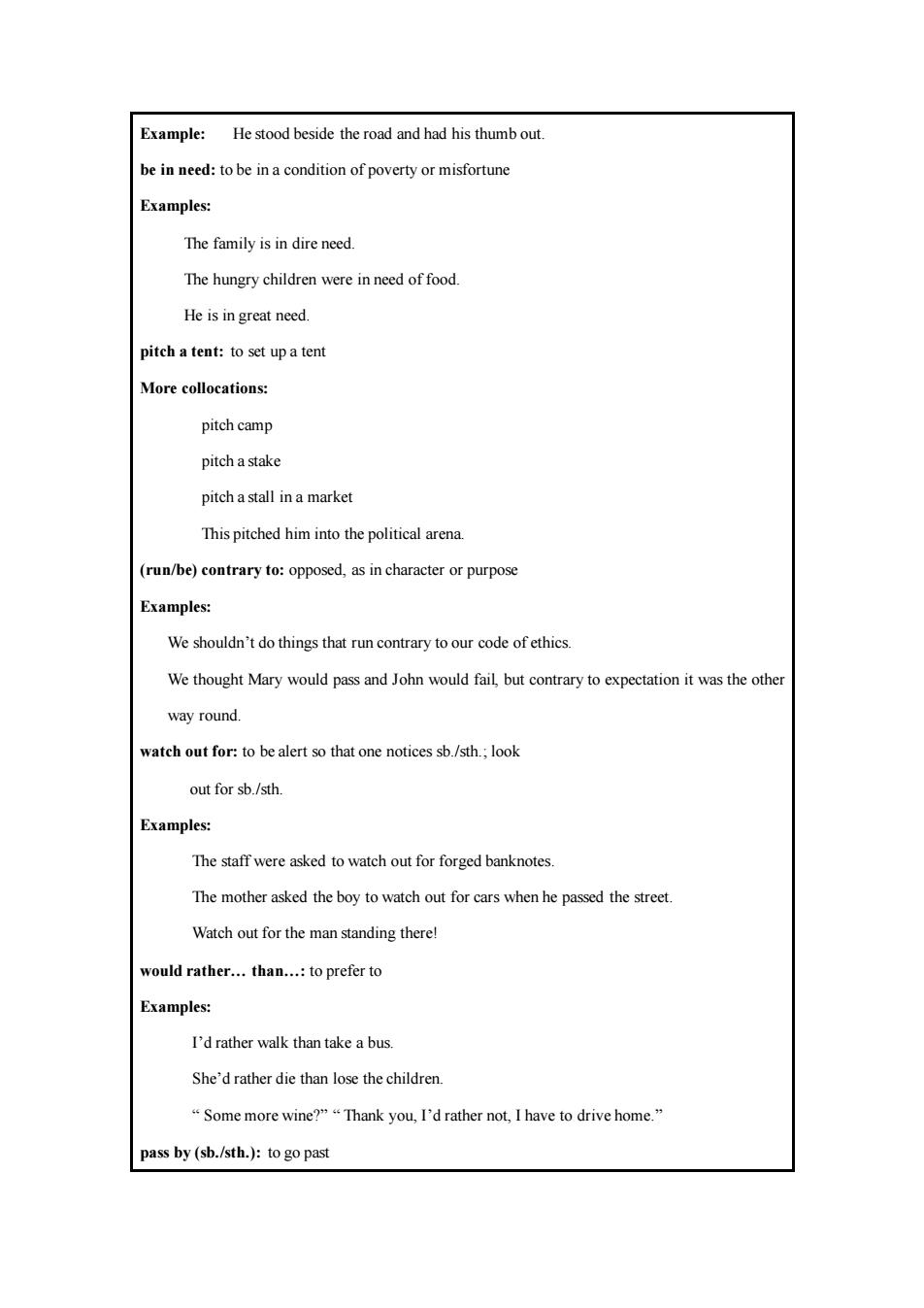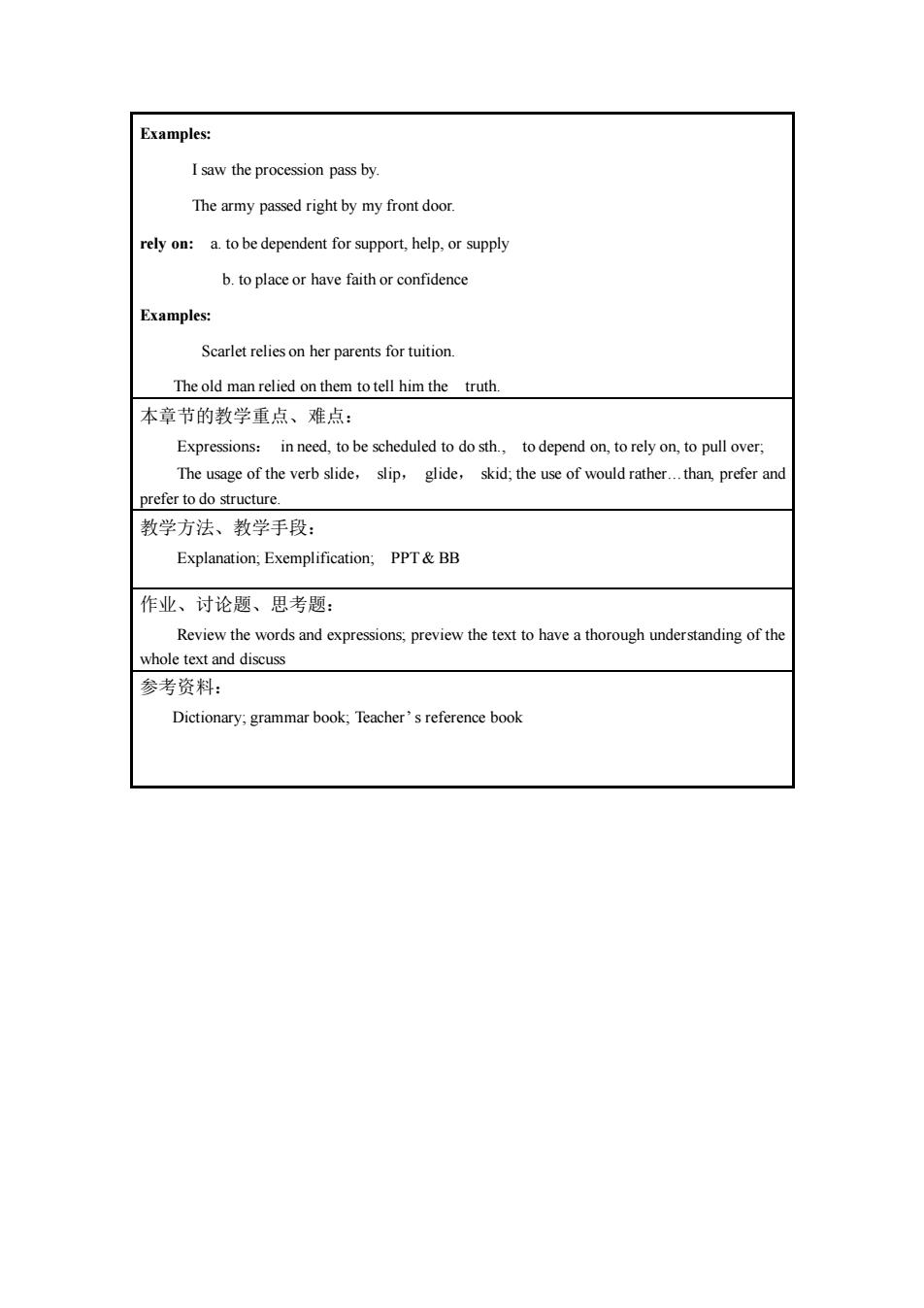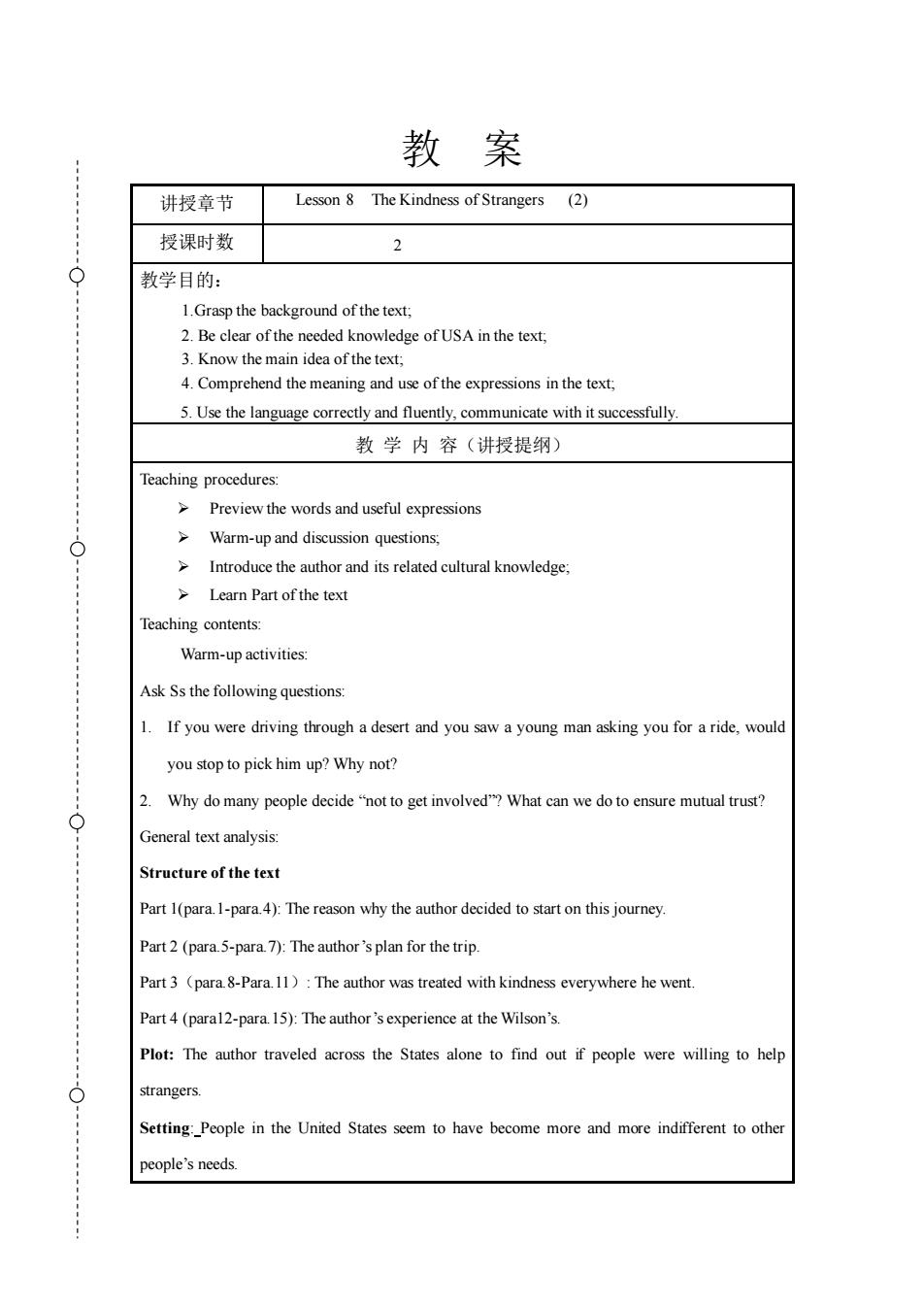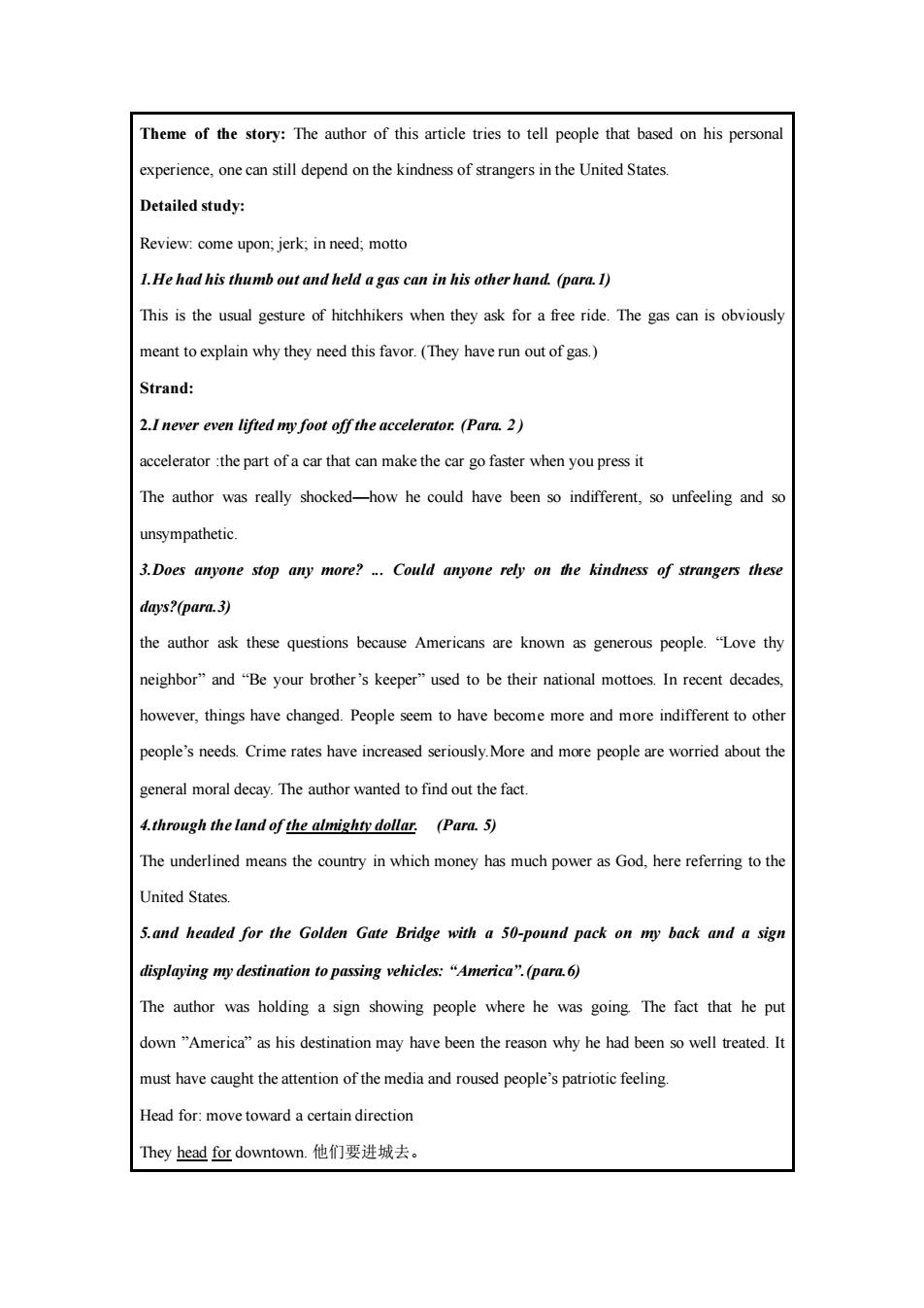
Example:He stood beside the road and had his thumb out. be in need:to be in a condition of poverty or misfortune Examples: The family is in dire need. The hungry children were in need of food. He is in great need. pitchatent:to set upa tent More collocations: pitchcamp pitchastake pitch astall ina market This pitched him into the political arena (run/be)contrary to:opposed,as in character or purpose Examples: We shouldn't do things that run contrary to our code of ethics We thought Mary would pass and John would fail,but contrary to expectation it was the other way round. :to bealert so that one notices sb./sth look out for sb./sth. Examples: The staff were asked to watch out for forged banknotes The mother asked the boy to watch out for cars when he passed the street. Watch out for the man standing there! would rather.than.toprefer to Examples: I'd rather walk than take a bus. She'd rather die than lose the children. "Some more wine?Thank you,I'd rather not Ihave to drive home." pass by (sb./sth.):to go past
Example: He stood beside the road and had his thumb out. be in need: to be in a condition of poverty or misfortune Examples: The family is in dire need. The hungry children were in need of food. He is in great need. pitch a tent: to set up a tent More collocations: pitch camp pitch a stake pitch a stall in a market This pitched him into the political arena. (run/be) contrary to: opposed, as in character or purpose Examples: We shouldn’t do things that run contrary to our code of ethics. We thought Mary would pass and John would fail, but contrary to expectation it was the other way round. watch out for: to be alert so that one notices sb./sth.; look out for sb./sth. Examples: The staff were asked to watch out for forged banknotes. The mother asked the boy to watch out for cars when he passed the street. Watch out for the man standing there! would rather. than.: to prefer to Examples: I’d rather walk than take a bus. She’d rather die than lose the children. “ Some more wine?” “ Thank you, I’d rather not, I have to drive home.” pass by (sb./sth.): to go past

Examples: I saw the procession pass by. The army passed right by my front door relyo:a tobe dependent for support,help,or supply b.to place or have faith or confidence Examples: Scarlet relieson her parents for tuition Theold manrelied on them totell him the truth. 本章节的教学重点、难点: Expressions:in need,to be scheduled to do sth.,to depend on,to rely on,to pull over. The usage of the verb slide,slip,glide,skid:the use of would rather.than prefer an prefer to do structure. 教学方法、教学手段: Explanation;Exemplification:PPT&BB 作业、讨论题、思考题: Review the words and expressions;preview the text to have a thorough understanding of the whole text and discuss 参考资料: Dictionary,grammar book,Teacher's reference book
Examples: I saw the procession pass by. The army passed right by my front door. rely on: a. to be dependent for support, help, or supply b. to place or have faith or confidence Examples: Scarlet relies on her parents for tuition. The old man relied on them to tell him the truth. 本章节的教学重点、难点: Expressions: in need, to be scheduled to do sth., to depend on, to rely on, to pull over; The usage of the verb slide, slip, glide, skid; the use of would rather.than, prefer and prefer to do structure. 教学方法、教学手段: Explanation; Exemplification; PPT & BB 作业、讨论题、思考题: Review the words and expressions; preview the text to have a thorough understanding of the whole text and discuss 参考资料: Dictionary; grammar book; Teacher’s reference book

教案 讲授章节Lesson8 The Kindness of Strangers(②) 授课时数 2 Q 教学目的: 1.Grasp the background of the text, 2.Be clear of the needed knowledge of USA in the text. 3.Know the main idea ofthe text; 4.Comprehend the meaning ands ofthe expressions inthe text. 5.Use the language correctly and fluently,communicate with it successfully. 教学内容(讲授提纲) Teaching procedures: >Preview the words and useful expressions Warm-up and discussion questions, Introduce the author and its related cultural knowledge; Learn Part ofthe text Teaching contents: Warm-up activities: Ask Ss the following questions: 1.If you were driving through a desert and you saw a young man asking you for aride,woul you stop to pick him up?Why not? 2.Why do many people decide"ot to get involved"What can we do to ensure mutual trust? ● General text analysis: Structure of the text Part I(para.I-para.4):The reason why the author decided to start on this journey. Part 2(para5-para7):The author'splan for the trip. Part 3(para 8-Para.11):The author was treated with kindness everywhere he went Part4(paral2-para 15):The author'sexperience at the Wilson's Plot:The author traveled across the States alone to find out if people were willing to help strangers. Setting:People in the United States seem to have become more and more indifferent to othe people's needs
教 案 讲授章节 Lesson 8 The Kindness of Strangers (2) 授课时数 2 教学目的: 1.Grasp the background of the text; 2. Be clear of the needed knowledge of USA in the text; 3. Know the main idea of the text; 4. Comprehend the meaning and use of the expressions in the text; 5. Use the language correctly and fluently, communicate with it successfully. 教 学 内 容(讲授提纲) Teaching procedures: ➢ Preview the words and useful expressions ➢ Warm-up and discussion questions; ➢ Introduce the author and its related cultural knowledge; ➢ Learn Part of the text Teaching contents: Warm-up activities: Ask Ss the following questions: 1. If you were driving through a desert and you saw a young man asking you for a ride, would you stop to pick him up? Why not? 2. Why do many people decide “not to get involved”? What can we do to ensure mutual trust? General text analysis: Structure of the text Part 1(para.1-para.4): The reason why the author decided to start on this journey. Part 2 (para.5-para.7): The author’s plan for the trip. Part 3(para.8-Para.11): The author was treated with kindness everywhere he went. Part 4 (para12-para.15): The author’s experience at the Wilson’s. Plot: The author traveled across the States alone to find out if people were willing to help strangers. Setting: People in the United States seem to have become more and more indifferent to other people’s needs

Theme of the story:The author of this article tries to tell people that based on his personal experience,one can still depend on the kindness of strangers in the United States. Detailedstudy: Review:come upon;jerk;in need;motto 1.He had his thumb out and held a gas can in his other hand.(para.1) This is the usual gesture of hitchhikers when they ask for afree ride.The gas can is obviously meant why they need this favor.(They have run ou of as) Strand: 2.I never even lifted my foot off the accelerator.(Para.2) accelerator the part ofa car that n make the car go faster when you pressit The author was really shocked-how he could have been so indifferent,so unfeeling and so unsympathetic. 3.Does anyone stop any more?.Could anyone rely on the kindness of strangers these days?(para.3) the author ask these questions because Americans are known as generous people."Love thy neighbor"and"Be your brother's keeper"used to be their national mottoes.In recent decades. however,things have changed.People seem to have become more and more indifferent to othe people's needs.Crime rates have increased seriously.More and more people are worried about the general moral decay.The author wanted to find out the fact. 4.through the land of the almighty dollar.(Para.5) The underlined means the in which money has much power as God,here referring to th United States. 5.and headed for the Golden Gate Bridge with a 50-pound pack on my back and a sign displaying my destination to pasing vehicles:"America".(para.6) The author was holding a sign showing people where he was going The fact that he put downAmerica"as his destination may have been the reason why he had been so well treated.It must have caught the attention of the media and roused people's patriotic feeling. Head for:move toward a certain direction They head for downtown.他们要进城去
Theme of the story: The author of this article tries to tell people that based on his personal experience, one can still depend on the kindness of strangers in the United States. Detailed study: Review: come upon; jerk; in need; motto 1.He had his thumb out and held a gas can in his other hand. (para.1) This is the usual gesture of hitchhikers when they ask for a free ride. The gas can is obviously meant to explain why they need this favor. (They have run out of gas.) Strand: 2.I never even lifted my foot off the accelerator. (Para. 2 ) accelerator :the part of a car that can make the car go faster when you press it The author was really shocked—how he could have been so indifferent, so unfeeling and so unsympathetic. 3.Does anyone stop any more? . Could anyone rely on the kindness of strangers these days?(para.3) the author ask these questions because Americans are known as generous people. “Love thy neighbor” and “Be your brother’s keeper” used to be their national mottoes. In recent decades, however, things have changed. People seem to have become more and more indifferent to other people’s needs. Crime rates have increased seriously.More and more people are worried about the general moral decay. The author wanted to find out the fact. 4.through the land of the almighty dollar. (Para. 5) The underlined means the country in which money has much power as God, here referring to the United States. 5.and headed for the Golden Gate Bridge with a 50-pound pack on my back and a sign displaying my destination to passing vehicles: “America”.(para.6) The author was holding a sign showing people where he was going. The fact that he put down ”America” as his destination may have been the reason why he had been so well treated. It must have caught the attention of the media and roused people’s patriotic feeling. Head for: move toward a certain direction They head for downtown. 他们要进城去

Pull over:把(车)靠拢路边 Please pull over and drop me here 6.when it seemed torn conrary to their own best interests(Para.7) to run contrary means:to run against,to run contrary; contrary is an adverb when it seemed to be ina way that is opposite to their best interests./when it seemed to b exactly what they should not have done for their own safety. 7.I didn't know whether to kiss them orscold them for stopping.(para.8) The author was deeply touched.He said this to emphasize the kindness and courage of the two old ladies not that it was wrongor stupid 8.a trucker pulled over,locking his brakes so hard he skidded on the grass shoulder (Para.9) Atruncker means truck-driver ocking means putting(slamming in/applying)his brakes skidded means to side sideways and become out of conro .But I hate to see.(ParH.9)我真不愿见到. Examples: I hate to disturb you but could you take a look at my computer? I really hate to ask my parents for money Quiz nable to move from the place where entertain you are athing such as a car or bus etc.use folk for carrying people or things o find sth.again after it has been lost stranded a short statement used as a guide of vehicle chaviour renew
Pull over: 把(车)靠拢路边 Please pull over and drop me here. 6.when it seemed to run contrary to their own best interests. (Para. 7) to run contrary means:to run against; to run contrary; contrary is an adverb . when it seemed to be in a way that is opposite to their best interests. /. when it seemed to be exactly what they should not have done for their own safety. 7.I didn’t know whether to kiss them or scold them for stopping.(para.8) The author was deeply touched. He said this to emphasize the kindness and courage of the two old ladies, not to suggest that it was wrong or stupid. 8. a trucker pulled over, locking his brakes so hard he skidded on the grass shoulder. ( Para. 9 ) A truncker means truck-driver locking means putting (slamming in/applying) his brakes skidded means to slide sideways and become out of control 9.But I hate to see. (Para. 9) 我真不愿见到. . Examples: I hate to disturb you , but could you take a look at my computer? I really hate to ask my parents for money Quiz unable to move from the place where you are entertain a thing such as a car or bus etc. used for carrying people or things folk to find sth. again after it has been lost stranded a short statement used as a guide of behaviour vehicle People renew